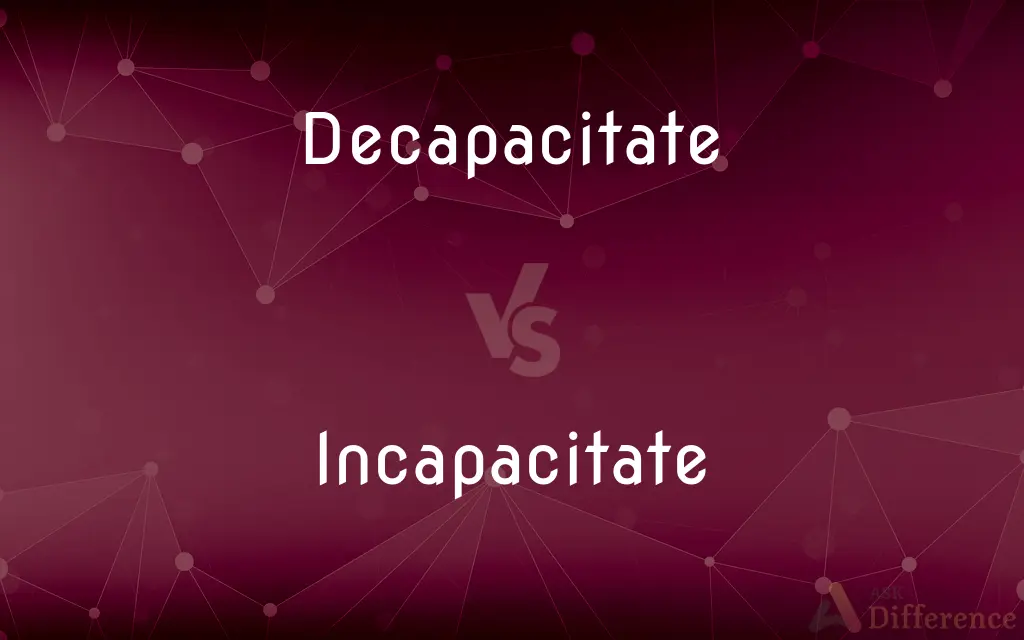Decapacitate vs. Incapacitate — What's the Difference?
By Maham Liaqat & Fiza Rafique — Updated on April 1, 2024
Decapacitate often implies reducing someone's abilities or power, whereas incapacitate refers to making someone or something unable to function normally.

Difference Between Decapacitate and Incapacitate
Table of Contents
ADVERTISEMENT
Key Differences
Decapacitate generally means to reduce someone's strength, power, or capability, often in a specific context or function. For instance, a policy change might decapacitate a regulatory body by limiting its enforcement capabilities. On the other hand, to incapacitate someone typically means to make them unable to act or respond effectively, often due to injury, illness, or other impairment. This can happen on a physical level, such as when a person is incapacitated by a disease, rendering them bedridden.
While decapacitate is used less frequently and usually in more metaphorical or specialized contexts, incapacitate has a broader application and is commonly used in medical, legal, and everyday language to describe a temporary or permanent reduction in ability. For example, a medication might incapacitate a patient by making them too drowsy to operate machinery safely.
Decapacitation might involve diminishing someone's authority or influence within a specific framework, affecting their ability to make decisions or wield power. This could happen in organizational structures where a leader's authority is curtailed. Incapacitation, conversely, could happen due to various factors like psychological conditions, physical restraints, or legal constraints, impacting a person's overall capability to perform tasks.
The term decapacitate might also imply a deliberate action to weaken an entity's functional capabilities without completely removing its ability to operate. This could be strategic in competitive scenarios. Incapacitate, however, often implies a more severe impairment of function, possibly even total, though it might be temporary, as in the case of sedation during surgery.
In terms of usage, decapacitate is more nuanced and may require additional context to be understood clearly, as its application is more specific and less common in everyday discourse. Incapacitate, however, is widely recognized and understood, making it a more accessible term for general use to describe situations of disability or inability.
ADVERTISEMENT
Comparison Chart
Definition
Reduce power or ability in a specific context.
Make unable or unfit to act or respond effectively.
Usage Context
Often metaphorical or organizational.
Medical, legal, everyday language.
Scope
May imply partial reduction of capability.
Often implies severe or total impairment.
Recovery
Implies possible strategic reduction, may be reversible.
May be temporary or permanent, depending on context.
Example
A legal amendment decapacitating a committee's power.
An injury incapacitating an athlete from competing.
Compare with Definitions
Decapacitate
To diminish authority or power.
The board's decision effectively decapacitated the CEO, limiting his decision-making powers.
Incapacitate
To render someone unable to perform activities.
The accident incapacitated her, requiring months of recovery.
Decapacitate
To weaken strategically.
The new policy decapacitated the competition, giving us a market advantage.
Incapacitate
To disable or immobilize through physical means.
The sedative incapacitated the patient for the duration of the surgery.
Decapacitate
To limit functionality within a specific scope.
The software update decapacitated older devices, making them slower.
Incapacitate
To impair the normal functioning of someone or something.
Heavy snowfall incapacitated the airport, canceling flights.
Decapacitate
To reduce the effectiveness of a system or organization.
Budget cuts have decapacitated the public health system, affecting its service delivery.
Incapacitate
To make a system or mechanism non-functional.
The virus incapacitated the computer network, halting all work.
Decapacitate
To reduce capacity or capability.
Without key resources, the team was decapacitated, unable to meet project deadlines.
Incapacitate
To legally restrict someone's rights or abilities.
The court ruling incapacitated him from holding any public office.
Decapacitate
To reduce something's or someone's capability to do something.
Calcium bursts would increase spermatozoa motility, where cholesterol would decapacitate spermatozoa, so preventing untimely activation.
Incapacitate
Prevent from functioning in a normal way
He was incapacitated by a heart attack
Incapacitate
To deprive of strength or ability; disable.
Incapacitate
To make legally ineligible; disqualify.
Incapacitate
To make someone or something incapable of doing something; to disable.
The police officer was incapacitated by a blow to the head.
Incapacitate
(law) To make someone ineligible; to disqualify.
Incapacitate
To deprive of capacity or natural power; to disable; to render incapable or unfit; to disqualify; as, his age incapacitated him for war.
Incapacitate
To deprive of legal or constitutional requisites, or of ability or competency for the performance of certain civil acts; to disqualify.
It absolutely incapacitated them from holding rank, office, function, or property.
Incapacitate
Make unable to perform a certain action;
Disable this command on your computer
Incapacitate
Injure permanently;
He was disabled in a car accident
Common Curiosities
How does incapacitate differ from decapacitate?
Incapacitate implies making someone or something completely unable to function or act, often due to physical, legal, or psychological reasons, whereas decapacitate often refers to a reduction in capability or power.
Can incapacitation be reversed?
In many cases, incapacitation can be reversed, especially if it's due to temporary conditions like sedation or legal restrictions.
Is decapacitation always intentional?
Decapacitation can be both intentional and unintentional, depending on the context, such as policy changes or resource limitations.
Does incapacitation imply permanence?
Incapacitation can be temporary or permanent, depending on the cause and context.
Can a person be decapacitated?
Yes, a person can be decapacitated, usually in a context where their power, influence, or ability to act is strategically reduced.
Is decapacitation used in military contexts?
Yes, in military contexts, decapacitation might refer to reducing the enemy's capability without total destruction.
What does decapacitate mean?
Decapacitate refers to reducing someone's or something's power, abilities, or effectiveness, often in a specific or strategic manner.
What are common causes of incapacitation?
Common causes include illnesses, injuries, psychological conditions, legal constraints, or chemical substances like drugs.
Can machines or systems be incapacitated?
Yes, machines or systems can be incapacitated by factors that make them unable to function properly, like malfunctions or external attacks.
Can incapacitation be a medical term?
Yes, in medical contexts, incapacitation refers to the inability to perform tasks or functions due to health issues.
Are there legal implications to incapacitating someone?
Yes, legally incapacitating someone, such as through guardianship, has significant legal implications regarding their rights and decision-making abilities.
How does decapacitation affect organizations?
It can limit an organization's functionality or effectiveness, affecting its goals and operations.
Can psychological conditions incapacitate someone?
Yes, severe psychological conditions can incapacitate individuals, affecting their ability to function normally.
How do you determine if someone is incapacitated?
Determination can involve medical evaluations, legal assessments, or functional tests, depending on the context.
What is the role of incapacitation in legal contexts?
In legal contexts, incapacitation can refer to restricting someone's legal capacities or imprisoning criminals to prevent them from harming society.
Share Your Discovery

Previous Comparison
Picturise vs. Picturize
Next Comparison
Receive vs. ReceiptAuthor Spotlight
Written by
Maham LiaqatCo-written by
Fiza RafiqueFiza Rafique is a skilled content writer at AskDifference.com, where she meticulously refines and enhances written pieces. Drawing from her vast editorial expertise, Fiza ensures clarity, accuracy, and precision in every article. Passionate about language, she continually seeks to elevate the quality of content for readers worldwide.















































